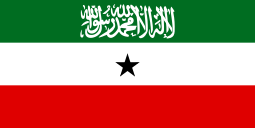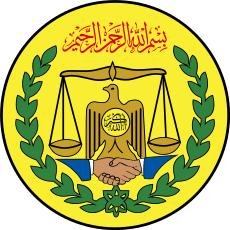Education in Somaliland
Education in Somaliland is provided in public and private schools. Education is Somaliland is managed by Ministry of Education and Science which controls the development and administration of state schools, it's also has an advisory and supervisory role in private schools.[1][2][3]
 | |
| Ministry of Education and Science (Somaliland) | |
|---|---|
| National education budget (2015) | |
| Budget | 5% of GDP |
| General details | |
| Primary languages | Somali |
| Literacy | |
| Total | 92.5% |
| Male | 95.5% |
| Female | 85.5% |
Ministry of Education and Science
The Ministry of Education and Science of Somaliland is a national body implementing the executive functions relating to the development of state policy and to legal regulation in the following spheres: basic education, secondary/vocational education, non-formal education, special needs education and higher education in both public and private institutions.[4][3] The Ministry of Education and Science of Somaliland is a national executive authority responsible for the state policy development and normative and legal regulation in the sphere of education, research, scientific, technological and innovation activities, nanotechnology, intellectual property, as well as in the sphere of nurturing, social support and social protection of students and pupils of educational institutions.[5] The work of the Ministry of Education and Science of Somaliland is governed by the Constitution of the Republic of Somaliland, National Education Act, National Constitutional Laws, and Decrees by the President of the Republic of Somaliland.[6] The Ministry of Education and Science of the Republic of Somaliland worked in cooperation with other national executive bodies, executive bodies of the subjects of the Republic of Somaliland, local authorities, public associations and other institutions.[7][8]
Somaliland Education System
The Somaliland education system has four main levels: pre-primary, primary/alternative, secondary/vocational and higher education.[9] Pre-primary (early childhood) is now integrated into formal education and in private Quranic School systems, running for up to two to three years.[10] Primary schooling lasts for eight years and is divided into a four year-elementary or lower primary cycle and a four-year intermediate or upper primary cycle. Secondary education and Vocational Training (as per design) also run for four years. The exception is the Arabic medium schools, which have 9 years of primary/intermediate schooling and 3 years of secondary education.[8] The tertiary level for both systems has a minimum of two years with many running for four. Each subsector is described and assessed in detail in the relevant chapters of this report.[11][3]
Vision
“Somaliland envisions education as means to prepare all learners to become life-long learners equipped with the skills, knowledge and attitudes to be successfully productive citizens”
This supports the Government of Somaliland's Vision 2030, which states that Somaliland will be:
“A nation whose citizens enjoy equitable and quality education.”[12]
The Vision provides a roadmap to ensure that no-one is left behind in national development, through its intent on affirmative action. Vision 2030 inspires Somalilanders to focus on commonly owned goals concerning and shared values and principles around which they can rally to build a prosperous nation.[8][13]
Mission
“The mission of National Education of Somaliland is to provide a quality and relevant education that will prepare every student to be success in life with partnership of its parents and communities” (Somaliland National Policy of Education, 2015-2030).[8][14]
Somaliland National Education Goals
To promote within society, the acquisition and application of relevant knowledge, skills and attitudes necessary to fulfill its potential for development in a continuously changing world:[15][16]
- Concern for proper management and utilization of the physical environment.
- A sense of responsibility for peace and improved relations at the individual, family, community, national and international levels.
- The growth of civic consciousness in an informed and socialized citizenry committed to mutual understanding, a culture of peace, and collaboration an acceptance of diversity, and toward resolving differences without violence.
- Values of loyalty, self-reliance, tolerance, co-operation, diligence, openness, inquiry, critical thought, honesty, justice, fairness and peace.
- Awareness of the need for and the active promotion of social justice, in the context of Islam.[8][17]
National Education Objectives
National goals for the education sector are further detailed for the education sector as follows:[18]
- To build the foundation for learners to be committed to the preservation and enrichment of their culture, and Islamic values.
- To provide learners with appropriate knowledge, insights, skills and values as well as empowering them to realize their potential that will able them to make worthwhile contributions to society.
- To provide children with the listening, speaking, reading and writing skills in Somali, Arabic, and English.[19]
- To provide a sound foundation of arithmetic and the application of mathematics to practical problems.
- To build the foundation for learners in the three areas of science while developing for them the practical application skills.
- To lay the foundation for basic information technology, and the awareness of the role of technology in national development.[3]
- To support learners, acquire practical skills and manual dexterity through productive activities integrated into the actual curriculum.
- Provide learners the opportunity to develop their individual talents and ability to acquire critical thinking, self-expression, self-reliance, and logical judgment.[20]
- To provide students the opportunities to appreciate learning and develop desire to continue learning
- To prepare students for tertiary and higher education, technical and vocational trainings.
- To provide young people with the basic skills which help them to contribute various communities in Somaliland in areas of animal husbandry, fishing, agriculture, budgeting, family welfare, community development, care for the environment, community health and physical fitness.
- To raise awareness among pupils about issues including reproductive health, HIV/AIDS, and STDs.[8]
See also
- Ministry of Education and Science (Somaliland)
- Ahmed Mohamed Diriye
- List of universities in Somaliland
- National Library of Somaliland
References
- "Cadami : Tayada Waxbarashada Waxay ku Xidhan tahay Aqoonta iyo Xirfada Macalimiinta". Guban Media (in Somali). 18 October 2019. Retrieved 11 March 2020.
- "Dhaqaale Loogu Yaboohay Waxbarashada Dalal ay Ka Mid Tahay Jamhuuriyadda Somaliland". Wargeyska Dawan (in Somali). 12 December 2019. Retrieved 11 March 2020.
- "Somaliland Education Statistics Year Book 2013-2014" (PDF). Unicef Somalia. 12 October 2014. Retrieved 11 March 2020.
- "The Cost and Quality of Education in Somaliland". Somaliland Current. 15 June 2019. Retrieved 9 March 2020.
- "Somaliland: New Study Shows Successful Primary Education Sector". UNPO. 16 August 2019. Retrieved 9 March 2020.
- "Wasaaradda Waxbarashada Somaliland oo faahfaahisay Xeer-nidaamiye Jaah-wareer ku abuuray Dugsiyada Gaarka loo leeyahay". Somaliland Post (in Somali). 19 September 2019. Retrieved 11 March 2020.
- "Somaliland, Education Cannot Wait and UNICEF launch multi-year programme to provide education to more than 54,000 children affected by crises". Relief Web. 13 July 2019. Retrieved 9 March 2020.
- "Ministry of Education and Higher Studies - Education Sector Strategic Plan (ESSP 2017-2021)" (PDF). Global Partnership. Retrieved 5 December 2019.
- "Xildhibaan Siciid oo Ka Hadlay Sidii Qorshe looga Yeelan-lahaa Waxbarashada Ubadka Ciidanka Qaranka". Wargeyska Dawan (in Somali). 24 December 2020. Retrieved 11 March 2020.
- "New schools in Somaliland give first opportunity to rural children". Radio Ergo. 22 November 2019. Retrieved 9 March 2020.
- "The Current Status of Educational Standard In Somaliland". Horn Diplomat. 28 January 2018. Retrieved 9 March 2020.
- "Shirweyne Lagu Gorfaynayo Man-hajka Waxbarashada Aasaasiga ah Ee Somaliland Oo Hargeysa Ka Furmay". Himilo Media (in Somali). 5 February 2018. Retrieved 11 March 2020.
- "Somaliland:The Nine Fundamental Problems with the Somaliland Education System". Somaliland Sun. 1 February 2019. Retrieved 9 March 2020.
- "With half of Somaliland children not in school, UNICEF and partners launch education access programme". UN News. 13 July 2019. Retrieved 9 March 2020.
- "Somaliland Ministry of Education launches National Education Review Conference". Somali Dispatch. 11 November 2019. Retrieved 9 March 2020.
- "SOMALILAND: Wasaaradda Waxbarashada Oo Dib-U-Habeyn Ku Samaysay MANHAJKA Waxbarashada Aasaasiga Ah". Himilo Media (in Somali). 21 October 2018. Retrieved 11 March 2020.
- "Milicsiga Manhajka Cusub Ee Wasaaradda Waxbarashada Somaliland". Hubaal Media (in Somali). 12 August 2016. Retrieved 11 March 2020.
- "SOMALILAND: Higher education booms despite challenges". University World News. 5 September 2010. Retrieved 9 March 2020.
- "Wasiirka Waxbarashada Somaliland oo faahfaahiyey Qorshe loo Marayo Mideynta Manhajka Waxbarasho ee dalka". Somaliland Post (in Somali). 18 January 2020. Retrieved 11 March 2020.
- "Somaliland: Manhajka Iyo Buugaagta Dugsiyada Sare Ee Dib U Eegida Lagu Sameeyey Maka Turjumayaan Baahida Nooca Waxbarasho Ee Ardayga" (in Somali). 28 June 2017. Retrieved 11 March 2020.
